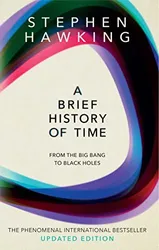This is one of the most famous and best-selling popular science books of all time, so I was interested to finally read it and find out if it’s actually any good. The book starts with an overview of modern physics and cosmology, incorporating the two main areas of general relativity and quantum mechanics. Hawking then goes on to write about black holes and his ideas about the origin (and ultimate fate) of the universe.
Black holes are the area of physics where Hawking produced his most famous work, including the idea of “Hawking Radiation”, so it’s really interesting to read about them from the perspective of one of the world’s experts. The central challenge in physics since the second-half of the 20th century has been to find a theory that incorporates both general relativity and quantum mechanics. Black holes are one of the places such a theory would apply, as is the beginning of the universe. Interestingly, as of the 1996 edition, Hawking seems quite positive about string theory as a possible way of resolving these discrepancies, although it seems to have fallen out of fashion since then. (I plan to do some reading about string theory soon.)
There is extensive discussion about the nature of time and what it might mean for time not to have existed before the start of the universe. One of the theories that Hawking talks about a lot in this book is something called the “no boundary proposal”. I would love to be able to succinctly explain what this means, but the truth is that I didn’t really understand it. I have read other books that have explained how the universe can be finite in size and yet have no edges. They usually explain it in terms of the surface of the earth, on which you can keep moving and never fall off the edge, but which is clearly finite in size. The no boundary proposal seems to be like this but for time. Does this mean that you could travel forward in time and eventually get back to the beginning of time? This isn’t explained. I also wondered whether the no boundary proposal would be affected by whether the universe will continue to expand forever, or start contracting back into a “big crunch”, but this isn’t made clear.
I read an edition of this book published in 2016. Developments in physics since the book was written in 1988 were incorporated into the body of the text for a 1996 edition, and these were retained for this edition. But this edition does have an appendix containing Hawking’s comments on developments in physics since the 1996 edition of this book was published. One of the most significant developments was the detection in 2016 of gravitational waves by the LIGO experiment, which provided further confirmation of Einstein’s General Theory of Relativity.
Another significant development was the discovery that the expansion of the universe is accelerating, rather than slowing down as had previously been expected, as described in the book The 4% Universe. Throughout the text Hawking often mentions the idea that the universe will eventually stop expanding and will start to contract. The speculations about what that might mean for the second law of thermodynamics, and the perception of the passage of time for any intelligent beings alive at that time, are among the most interesting in this book. But the current consensus is that the universe’s expansion is actually speeding up.
I enjoyed reading this book. But I think it falls short as a general introduction to physics and cosmology for people without a solid grounding in physics; there were large parts I didn’t understand! For a good introduction to the development of modern physics, I think the early parts of Reality Is Not What It Seems are still the best I’ve read so far. In A Brief History Of Time, the explanations feel a bit rushed, as though Hawking wants to get past this simple stuff to get onto his preferred topics. There is a nice glossary at the back though, and I thought the diagrams and some of the explanations and analogies were really good.
There are some odd choices around large numbers in this book. Hawking repeatedly describes very large numbers as so many thousand thousand thousand. I’m guessing he or his publisher didn’t want to risk confusing people by using exponentials. But it does make it a lot harder to read. He also doesn’t use the word “billion” instead opting for “thousand million”. Probably at the time of writing in 1988, there could have been confusion between the British and American billion, but I think we’ve all just adopted the American billion now, so this is unnecessarily confusing now.
Later in the book, Hawking seems to give up on the idea of explaining things to non-physicists, and instead is writing mainly for his fellow physicists. It can be very hard to follow. But it is really interesting to read Hawking’s speculations about black holes, time travel and the big bang and it gave me lots to think about.
